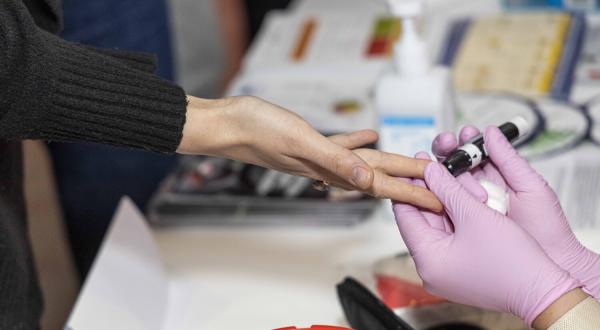RSU Professor and Infectologist Ludmila Vīksna on What Is Currently Known About COVID-19
- COVID-19 is the name of a disease
- caused by a virus called SARS-CoV-2
I will hereinafter list the facts, considerations, probabilities and prognoses at my disposal:
SARS-CoV-2 is the third coronavirus causing disease in humans. Its genome has an 80% approximate similarity with the SARS-CoV virus that caused disease in 2002–2003.
RSU health care and academic staff are considered a high-risk group due to possible exposure.
To ensure effective infection prevention we must be as educated as possible about the virus as an agent of disease, the possible routes of transmission, the number of infected persons, as well as the course and possible outcomes of the disease.
The information regarding the number of people infected, recovered, heavily affected and deceased patients is changing minute by minute, so I recommend following the developments in the materials provided by the Latvian Centre for Disease Prevention and Control (CDPC) and the World Health Organisation (WHO). Currently in the People's Republic of China, where the epidemic first started, approx. 82% of patients have already recovered and there are only approx. 10-15 new cases registered daily.
The epidemic has reached Latvia over two months after the initial spread worldwide, and in the meantime the epidemic has been practically limited in China. It was the unprecedented safety measures enforced by Chinese officials that made it possible for the entire world to effectively prepare for the epidemic.
Latvia had time to prepare, which has allowed for timely planning, diagnostics, information distribution, including at RSU, preventive measures for our citizens, and purchasing the necessary healthcare products, etc.
RSU structural units have made significant preparations:
We must understand that it is never possible to fully prepare in advance for the emergency spreading of any infection, however time and professional experience always improve the situation.
There are currently several news stories regarding the course of the epidemic:
the good news is that the spread of the epidemic has practically been halted in China and slowed considerably in South Korea. This is supported by information published by WHO;
the concerning news is that in about 100 cases, the infection was imported or brought over to China from other countries. This indicates the increase and broadening of the “circulation” of the virus;
the bad news is that the infection is spreading rapidly in Italy and Spain and is actively spreading to other territories, including Latvia, and the situation is yet to be brought under control.
The prevalence of the virus and the death rate in Italy is currently a serious concern. One theory is that the course of the disease is worsened because of the high proportion of seniors in the country, but this does not explain the rapid spread of the infection as seniors are less mobile.
It is currently difficult to predict how the infection will spread in other European countries, in the Americas and Australia. We must still be alert to the possibility of importing the SARS-Cov-2 infection to Latvia from Italy and other epidemically active countries.
We are trying to limit the spread of infection by ensuring timely diagnostics and imposing emergency limitations as well as other organisational measures here in Latvia, however, we must take into consideration the high number of seniors and the varied levels of social responsibility, which can sometimes be quite low.
It is important to understand that so far the only means of avoiding infection are “technical”, i.e. washing thoroughly, using individual food utensils, changing bedding frequently, ventilating rooms, using disinfectants and avoiding shaking hands, gatherings, crowds, swimming pools, touching, limiting contact with strangers to 15 minutes, and not to give in to provocations by irresponsible people who do not believe that caution should be exercised.
It is important to know that there might be other routes of transmission besides airborne droplets. According to information from China the virus has been found in both faeces and urine.
Fighting the spread of infection is difficult because we cannot realistically limit the spread of airborne droplets since people will still continue breathing.
While restrictions based on epidemiological patterns should be made global, the logistics are difficult to impose on a transnational level.
There is currently no etiologically effective medication. The known antiviral medication has no effect on the novel coronavirus SARS-CoV-2.
There is insufficient knowledge regarding the long-term development of specific antibodies because the epidemic started only approx. 3 months ago.
It is known, however, that approx. 80% of the cases are mild, approx. 15% require hospitalisation, whereas approx. 5% are severe cases.
Prognostically, patients aged 80+ form the highest risk group.
Each one of us is responsible for the economic and effective use of RSU resources in current conditions and keep in mind the unforeseen spread of the disease and therefore also the necessity of resources.
Social responsibility in the context of the spread of infection includes eac of us taking individual responsibility – students, lecturers, technical staff, etc., which will cause temporary discomfort due to restrictions, but this discomfort cannot be compared to possible death rates.
Please be aware that we will play an active role in the events related to the epidemic for at least the coming 2-3 months, but most likely until the end of the year.
It is crucial to prevent a rapid increase in the number of cases in Latvia for two reasons:
the more gradual the spread of infection is, the more rational and qualitative the medical assistance the use of existing resources available for patients will be;
there is more time for collective specific immunity to be developed by antibodies forming in individuals, which in turn results in herd immunity, thereby slowing down the circulation of viruses and limiting the number of new infections and morbidity.
Recommendations for RSU students and staff:
I hereby invite RSU students and staff to avoid taking irresponsible risks in order to prevent becoming infected and infecting others.
I invite the heads of our structural units to provide work conditions with the least possibility of infection and/or the most effective safeguarding for our colleagues working in groups of >65 people.
Please let me remind you that it is our duty to do everything in our power to limit the spread of the virus, including actively spreading information and cautioning those who are socially irresponsible and fail to comply with restrictions.
Academic Staff, Department of Infectology
Chair of Convent of Councillors
Related news
 RSU Health Day attracts many first-time donors and large number of student research groupsFor RSU Employees, For Students
RSU Health Day attracts many first-time donors and large number of student research groupsFor RSU Employees, For Students



